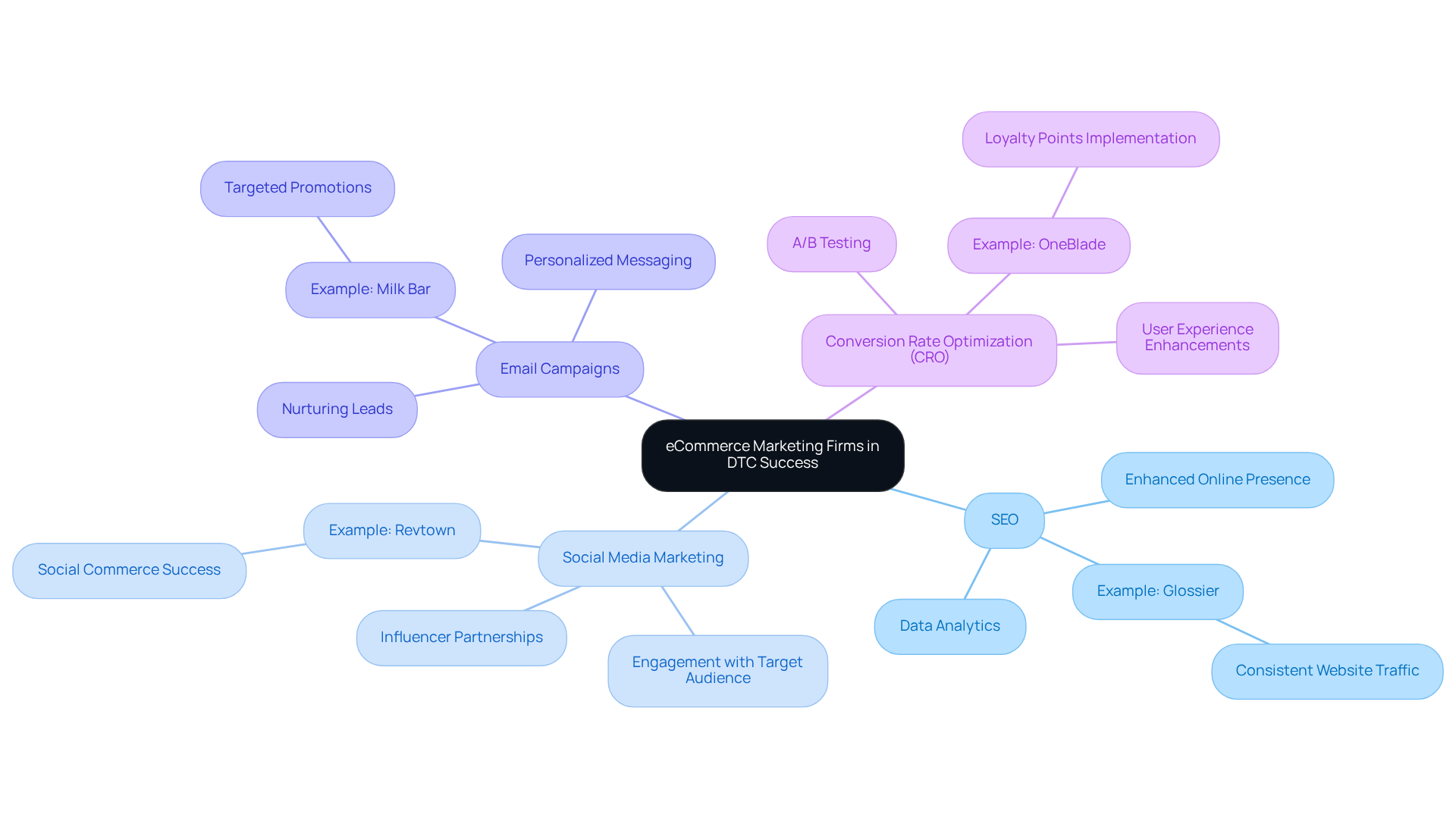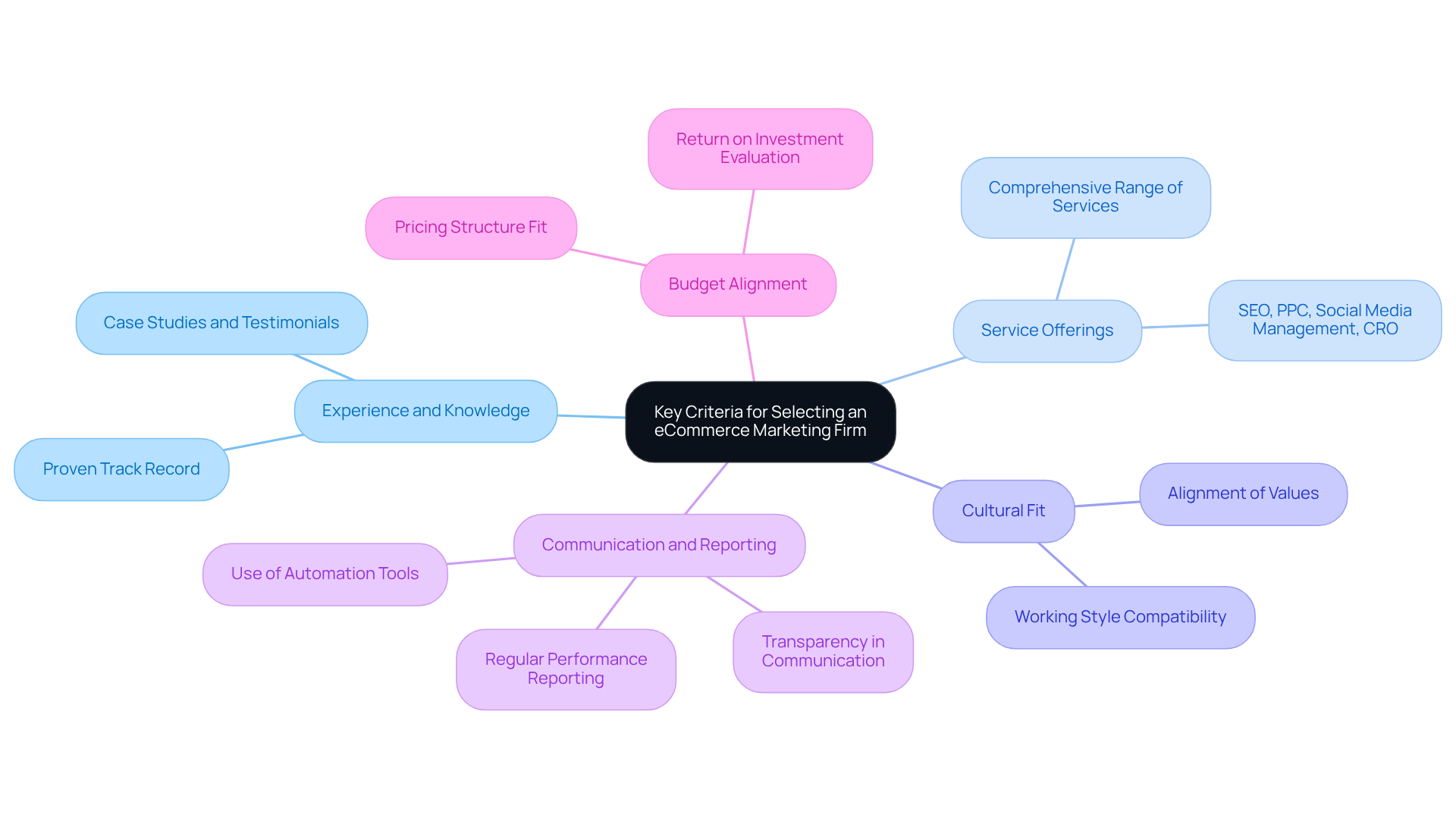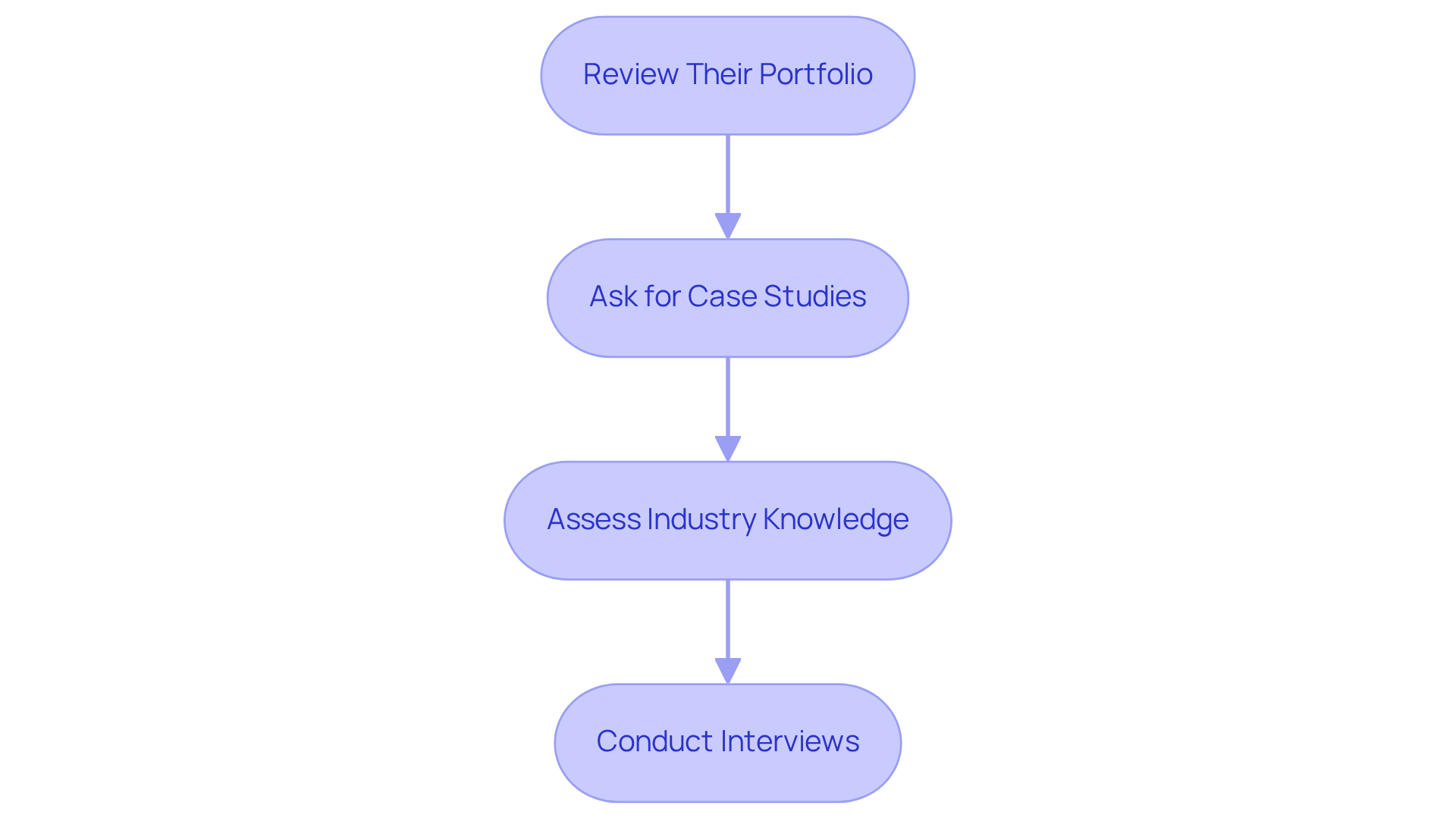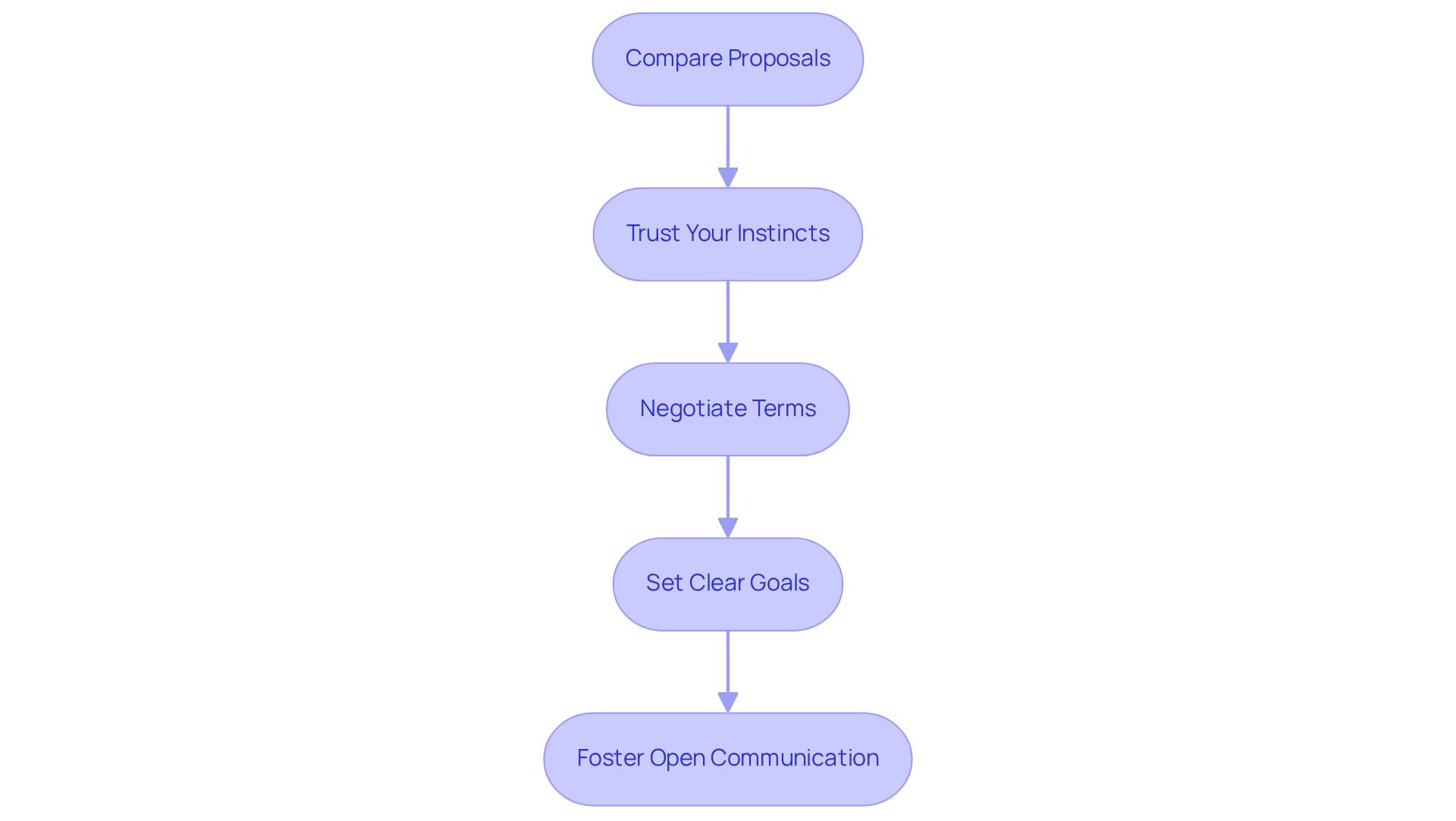
Overview
Selecting the right eCommerce marketing firm is crucial for achieving direct-to-consumer (DTC) success. These agencies leverage targeted strategies, including:
- SEO
- Social media marketing
- Data analytics
to enhance brand visibility and drive sales. It is imperative to choose a firm that not only has proven experience but also offers comprehensive services and aligns culturally with your brand. Such a selection can significantly influence marketing effectiveness and lead to sustained growth in an increasingly competitive landscape.
Introduction
Navigating the competitive landscape of direct-to-consumer (DTC) brands requires more than just a great product; it demands strategic marketing prowess. eCommerce marketing firms are essential partners, employing targeted strategies that enhance visibility and drive significant sales growth. However, with numerous agencies vying for attention, brands must ensure they select the right one that aligns with their unique goals and culture. This article delves into the crucial criteria for choosing an eCommerce marketing firm, empowering DTC brands to make informed decisions that pave the way for sustained success.
Understand the Role of eCommerce Marketing Firms in DTC Success
An ecommerce marketing firm plays a pivotal role in the success of direct-to-consumer (DTC) brands, employing targeted strategies that enhance visibility, drive traffic, and boost sales. These agencies concentrate on critical areas such as:
- Search engine optimization (SEO)
- Social media marketing
- Email campaigns
- Conversion rate optimization (CRO)
Industry reports indicate that DTC eCommerce sales in the US were projected to reach $17.75 billion in 2020, underscoring the growing importance of effective promotional strategies in this competitive landscape.
By leveraging data analytics and consumer insights, these firms empower companies to gain a profound understanding of their target audience, facilitating tailored marketing initiatives that resonate. For example, a robust SEO strategy can significantly elevate a company's online presence, simplifying the process for potential customers to discover their products. Glossier, a leading DTC brand, has adeptly utilized SEO to maintain consistent website traffic, illustrating the efficacy of these strategies.
Moreover, these agencies frequently implement A/B testing to refine promotional messages and enhance user experiences, ensuring that every interaction with the brand is meticulously designed to optimize conversions. As highlighted by Thrive Internet Marketing Agency, "data-driven strategies ensure your business maximizes its online potential and achieves significant growth." This holistic approach not only amplifies brand visibility but also substantially contributes to sales growth, rendering indispensable partners for DTC brands aiming for sustained success.

Identify Key Criteria for Selecting an eCommerce Marketing Firm
When selecting an eCommerce marketing firm, several key criteria should guide your decision-making process:
- Experience and Knowledge: Prioritize firms with a proven track record in your sector, particularly in DTC promotion. Reviewing their and client testimonials will provide valuable insights into their effectiveness and ability to deliver results—essential for your brand's success.
- Service Offerings: Confirm that the organization offers a comprehensive range of services that align with your promotional objectives. Critical services may include SEO, PPC, social media management, and conversion rate optimization (CRO), all vital for driving growth in the DTC space. Data from successful partnerships demonstrates that a well-rounded service offering can significantly enhance marketing effectiveness.
- Cultural Fit: The organization's values and working style must resonate with your company's culture. A strong cultural alignment fosters a productive partnership and enhances collaboration, ultimately leading to superior outcomes.
- Communication and Reporting: Transparency in communication and regular performance reporting are crucial for maintaining alignment and trust. Agencies that leverage automation tools and AI-driven dashboards for reporting can provide real-time insights into campaign effectiveness, ensuring you remain informed about progress and results.
- Budget Alignment: Ensure that the organization's pricing structure fits within your budget while still delivering the quality of service you expect. A well-defined budget aids in evaluating the potential return on investment (ROI) from the partnership, and transparency in pricing is vital for a successful collaboration.
By concentrating on these criteria, DTC brands can make informed decisions when choosing an ecommerce marketing firm, ultimately enhancing their chances of success in a competitive landscape.

Evaluate Agency Expertise and Alignment with Your Brand Goals
To effectively assess an organization's expertise, follow these essential steps:
- Review Their Portfolio: Begin by examining the agency's past work to evaluate the quality and relevance of their campaigns. Look for results that illustrate the ecommerce marketing firm's ability to , including significant increases in Average Order Value (AOV) and conversion rates, as exemplified by Parah Group's compelling case studies.
- Ask for Case Studies: Request detailed case studies that outline the challenges faced, strategies implemented, and results achieved for previous clients. For instance, an ecommerce marketing firm, Parah Group, assisted a $30M apparel brand in realizing a 35% increase in conversion rates through strategic homepage redesigns and gamified shipping thresholds. This will provide invaluable insight into their problem-solving capabilities.
- Assess Industry Knowledge: Ensure the organization possesses experience in your specific industry or niche. A thorough understanding of market dynamics can significantly enhance their effectiveness, as demonstrated by Parah Group's tailored approaches for various sectors, including apparel and cleaning products, which can be applied by an ecommerce marketing firm.
- Conduct Interviews: Engage in discussions with the organization's team to evaluate their understanding of your brand objectives and their proposed strategies for achieving them. This interaction can reveal their commitment and alignment with your vision, particularly if they can articulate a data-driven approach to optimizing your existing resources for sustainable growth.

Make an Informed Decision and Establish a Productive Partnership
Once you have assessed possible firms and narrowed down your options, follow these steps to make an informed decision:
- Compare Proposals: Review the proposals from your selected firms, focusing on their strategies, timelines, and pricing. Look for innovative approaches that align with your brand's goals. A survey reveals that over 49% of organizations utilizing data-driven initiatives to decrease expenses reported positive outcomes, underscoring the significance of informed decision-making.
- Trust Your Instincts: Reflect on your interactions with the representatives. A good rapport can indicate a productive partnership, as effective collaboration often stems from mutual understanding and respect.
- Negotiate Terms: Engage in discussions to negotiate the terms of the partnership, including deliverables, timelines, and payment structures. It is essential that both parties have clear expectations. Tim Stobierski emphasizes that while intuition may provide a hunch, it is that you can verify and comprehend your decisions.
- Set Clear Goals: Establish measurable goals and key performance indicators (KPIs) to track the success of your campaigns. This approach will help maintain accountability and ensure alignment throughout the partnership.
- Foster Open Communication: After establishing the partnership, maintain regular communication to discuss progress, challenges, and adjustments needed to optimize performance. Evaluating client reviews and testimonials is crucial when selecting an agency, as they offer valuable insights into the agency's performance and customer satisfaction.

Conclusion
Choosing the right eCommerce marketing firm is not just important; it is crucial for the success of direct-to-consumer (DTC) brands. These agencies play a pivotal role in developing targeted strategies that enhance visibility, drive traffic, and ultimately boost sales. By understanding their significance and the value they provide, businesses can strategically position themselves for sustained growth in a competitive landscape.
This article outlines essential criteria for selecting an eCommerce marketing firm, emphasizing the importance of:
- Experience
- Service offerings
- Cultural fit
- Communication
- Budget alignment
It is imperative to evaluate agency expertise through portfolio reviews, case studies, and direct discussions. By adhering to these guidelines, DTC brands can make informed decisions that align with their unique goals and significantly enhance their marketing effectiveness.
Ultimately, the partnership with an eCommerce marketing firm should be viewed as a strategic alliance that fosters growth and innovation. As DTC brands navigate the complexities of the eCommerce environment, leveraging the expertise of these agencies can lead to substantial advancements in market presence and sales performance. Investing time and resources in selecting the right partner will not only yield immediate benefits but will also lay the groundwork for long-term success in the ever-evolving digital marketplace.
Frequently Asked Questions
What is the role of eCommerce marketing firms in DTC success?
eCommerce marketing firms play a crucial role in the success of direct-to-consumer (DTC) brands by employing targeted strategies that enhance visibility, drive traffic, and boost sales.
What areas do eCommerce marketing firms focus on?
These firms concentrate on critical areas such as search engine optimization (SEO), social media marketing, email campaigns, and conversion rate optimization (CRO).
How significant were DTC eCommerce sales in the US in 2020?
DTC eCommerce sales in the US were projected to reach $17.75 billion in 2020, highlighting the growing importance of effective promotional strategies.
How do eCommerce marketing firms utilize data analytics?
They leverage data analytics and consumer insights to help companies understand their target audience, facilitating tailored marketing initiatives that resonate with consumers.
Can you provide an example of a successful DTC brand using eCommerce marketing strategies?
Glossier is a leading DTC brand that has effectively utilized SEO to maintain consistent website traffic, showcasing the efficacy of these marketing strategies.
What is A/B testing and why is it important for eCommerce marketing?
A/B testing is a method used to refine promotional messages and enhance user experiences, ensuring that every interaction with the brand is designed to optimize conversions.
How do data-driven strategies benefit DTC brands?
Data-driven strategies ensure that businesses maximize their online potential and achieve significant growth, amplifying brand visibility and contributing to sales growth.
FAQs











